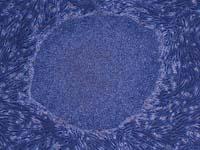Difficulties in researching induced stem cells

An article published by the journal Nature on stem cells has had quite an impact in this field of research. In fact, the article "Hotspots of aberrant epigenomic reprogramming in human induced pluripotent stem cells" highlights a problem presented by induced stem cells.
The research, led by Joseph Ecker of the Salk Institute, has had the participation of researchers from the most important centers in the United States. In fact, induced stem cells have created great hope among researchers, since they have characteristics similar to embryonic stem cells and do not generate ethical problems.
However, it has now been shown that induced stem cells may not be useful in treatments due to epigenetic changes. Epigenetic changes modify gene expression, activate or inactivate it without modifying DNA. Well, induced stem cells retain in the genome the memory of their maturity, and these epigenetic marks remain in any tissue or organ derived from them.
For Gurutz Linazasoro, research has shown that the technology to create reprogrammed pluripotent cells is not yet "perfect." Linazasoro is president of the Inbiomed Foundation, specializing in stem cell research and regenerative medicine, and explains that one of the most important epigenetic processes is histone methylation.
Induced stem cells from adult skin cells have been contrasted with embryonic stem cells and have found changes in the methylation model. For example, some genome fragments methylated in mature cells are thus in stem cells, but not embryonic. That is the "most important difference," according to Linazasoro.
However, for Linazasoro, this obstacle is not insurmountable, since "the scientific basis of cellular reprogramming is very solid".
Buletina
Bidali zure helbide elektronikoa eta jaso asteroko buletina zure sarrera-ontzian











